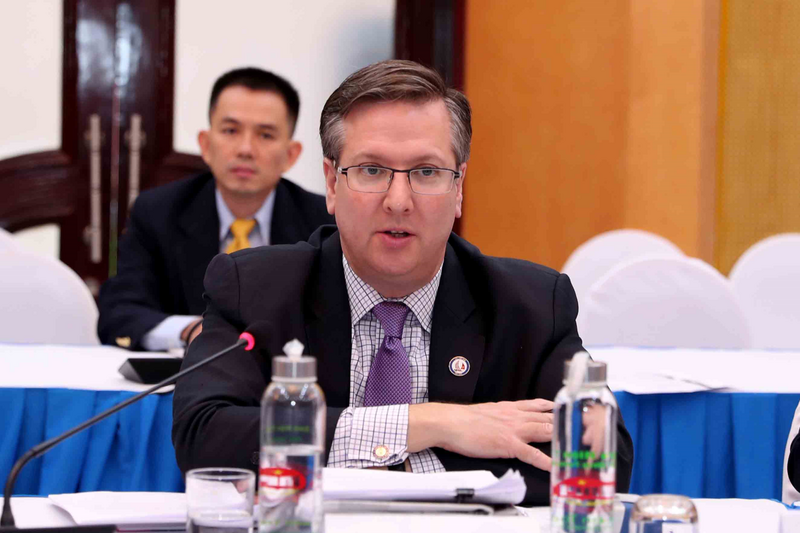Strong partnership with Vietnam vital to US strategic presence in Indo-Pacific: USABC
Vietnam is an important partner for US in ASEAN as well as a growing market for American exports and increasingly an important part of global supply chains for American companies, said the Chairman of the US-ASEAN Business Council.
A strong partnership with Vietnam is not only vital to US national economic and geopolitical interests, but also has significant effects on the country’s strategic relationships with other countries in the Indo-Pacific.
| Chairman, President and CEO of the US – ASEAN Business Council (USABC) Alexander C. Feldman at a meeting with Vietnam's Ministry of Planning and Investment last March. Photo: mpi.gov.vn |
Chairman, President and CEO of the US – ASEAN Business Council (USABC) Alexander C. Feldman made the statement in response to the office of the US Trade Representative (USTR)’s decision to not impose tariffs on Vietnam following its investigation into the latter’s currency practice.
“Vietnam is an important partner for US in ASEAN as well as a growing market for American exports and increasingly an important part of global supply chains for American companies” Mr. Feldman suggested.
In the report released on January 15, the USTR concluded that while Vietnam’s acts, policies, and practices are actionable under section 301 of the Trade Act, there were no mention of recommended actions or tariff guidelines.
Mr. Feldman, on behalf of the Council and its members, previously testified at the December 29, 2020 USTR hearing on the currency valuation practices and submitted associated written comments to USTR.
In his written and oral testimony, Mr. Feldman advocated for USTR to suspend its 301 investigation on currency until the US Treasury Department’s negotiations with the Vietnamese Government have reached an outcome in accordance with the Trade Facilitation and Trade Enforcement Act of 2015.
Treasury, he argued, has the subject matter expertise on currency and should be given every opportunity to work to resolve the specific issues around currency manipulation with the Vietnamese. As a result, USTR has given Treasury and the incoming Biden Administration the time to engage the Vietnamese government on ways which could resolve differences and provide further market opening opportunities for US business in the months ahead.
“We applaud Ambassador Robert Lighthizer’s decision not to take action or impose unilateral tariffs on Vietnam at this time and to allow USTR, Treasury, and the Biden Administration to work with the Government of Vietnam to find a path forward that hopefully benefits American companies, American workers and Vietnam,” said Mr. Feldman.
According to Mr. Feldmand, the Council will work with the new USTR and Biden Administration to discuss further recommendations on this issue and the way forward to strengthen US-Vietnam relations.
In a phone talk with US National Security Adviser Robert O’Brien on January 15, Deputy Prime Minister and Foreign Minister Pham Binh Minh welcomed the USTR’s decision that had taken into consideration concern and interests of the business communities of the two countries.
Mr. O’Brien stressed the US’s stance of supporting a strong, independent and prosperous Vietnam, which is playing an increasingly important role in the region and actively contributing to peace, stability and the development of the global stage.
The US National Security Advisor highlighted the efforts of Vietnamese government agencies in cooperating with their US peers and the USTR regarding the investigation, saying active dialogue will contribute to further expanding bilateral relations and mutual benefits for all parties involved.












